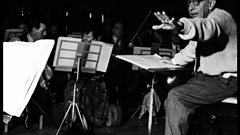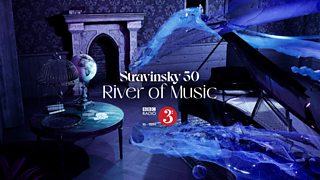Igor Stravinsky: Understood Best by Children and Animals
'My music is best understood by children and animals,' said Igor Stravinsky. Undaunted, Tom Service seeks the essence of one of the 20th century's most elusive composers.
"My music is best understood by children and animals," pronounced Igor Stravinsky, no doubt with a twinkle in his eye. According to his critics (and jealous colleagues), Stravinsky's composing consisted of picking up any old second-hand musical baubles he fancied, like a restless musical magpie - sometimes he even had the effrontery to leave them virtually unchanged. Frustratingly, audiences seemed to lap it up. To make matters worse, when it came to explaining his music, Igor liked nothing better than to hide behind contradictory and gnomic statements, as bewildering and frequent as his changes of musical style.
Tom Service goes in search of the essence of Stravinsky, at once one of the greatest yet most elusive 20th Century composers. Including contributions from playwright Meredith Oakes and Stravinsky biographer Jonathan Cross.
David Papp (producer).
Last on
More episodes
Clip
-
![]()
Igor Stravinsky: The Musical Magpie
Duration: 02:02
Music Played
-
![]()
John Adams
Son of Chamber Symphony
Performer: Alarm Will Sound. Performer: Alan Pierson.- Cantaloupe.
-
![]()
John Williams
Main theme from 'Jaws'
Performer: Royal Philharmonic Orchestra. Performer: Nic Raine.- Sony.
-
![]()
Igor Stravinsky
The Rite of Spring (Part 1: L'Adoration de la Terre)
Performer: The Cleveland Orchestra. Performer: Pierre Boulez.- DG.
-
![]()
Igor Stravinsky
Movements for Piano and Orchestra (V. Eighth note = 104)
Performer: Charles Rosen. Performer: Columbia Symphony Orchestra. Performer: Igor Stravinsky.- Sony.
-
![]()
Igor Stravinsky
Apollon musagète (Naissance d'Apollon)
Performer: Royal Concertgebouw Orchestra. Performer: Riccardo Chailly.- Decca.
-
![]()
Igor Stravinsky
Ebony Concerto
Performer: Michel Arrignon. Performer: Ensemble intercontemporain. Performer: Pierre Boulez.- DG.
-
![]()
Igor Stravinsky
Symphony No.1 in E flat, Op.1 (II. Scherzo)
Performer: St. Petersburg Philharmonic Orchestra. Performer: Vladimir Ashkenazy.- Decca.
-
![]()
Igor Stravinsky
3 Easy Pieces for Piano Duet (II. Waltz)
Performer: Katia Labèque. Performer: Marielle Labèque.- Philips.
-
![]()
Igor Stravinsky
Mavra (Chanson russe)
Performer: Olli Mustonen. Performer: Isabelle van Keulen.- Philips.
-
![]()
Igor Stravinsky
Pulcinella (I. Overture)
Performer: Saint Paul Chamber Orchestra. Performer: Christopher Hogwood.- Decca.
-
![]()
Domenico Gallo
Trio Sonata No.1 in G major (I. Moderato)
Performer: Christopher Hogwood. Performer: Romuald Tecco. Performer: Thomas Kornacker. Performer: Peter Howard.- Decca.
-
![]()
Igor Stravinsky
Pulcinella (XVII. Vivo)
Performer: Saint Paul Chamber Orchestra. Performer: Christopher Hogwood.- Decca.
-
![]()
Giovanni Battista Pergolesi
Sinfonia for cello and continuo (IV. Presto)
Performer: Christopher Hogwood. Performer: Joshua Koestenbaum. Performer: Peter Howard.- Decca.
-
![]()
Domenico Gallo
Trio Sonata No. 12 in E major (III. Allegro)
Performer: Parnassi Musici.- CPO.
-
![]()
Igor Stravinsky
Pulcinella (XIX. Allegro assai)
Performer: Saint Paul Chamber Orchestra. Performer: Christopher Hogwood.- Decca.
-
![]()
Arnold Schoenberg
3 Satiren, Op. 28 (II. Vielseitigkeit)
Performer: London Sinfonietta. Performer: Simon Joly Chorale. Performer: Robert Craft.- Naxos.
-
![]()
Igor Stravinsky
The Rite of Spring (Part 1: L'Adoration de la Terre)
Performer: The Cleveland Orchestra. Performer: Pierre Boulez.- DG.
-
![]()
Igor Stravinsky
The RakeΒs Progress (Act 1, Sc.2 Cavatina: Love, too frequently betrayed)
Performer: Ian Bostridge. Performer: Monteverdi Choir. Performer: London Symphony Orchestra. Performer: Sir John Eliot Gardiner.- DG.
-
![]()
Igor Stravinsky
Expectans expectavi, Dominum (Symphony of Psalms)
Choir: Tenebrae. Orchestra: ΒιΆΉΤΌΕΔ Symphony Orchestra. Conductor: Nigel Short.- Signum.
-
![]()
Igor Stravinsky
Oedipus Rex (Act II: Oracula mentiuntur - Pavesco maxime)
Performer: Anne Sofie von Otter. Performer: Swedish Radio Symphony Orchestra. Performer: EsaβPekka Salonen.- Sony.
-
![]()
Igor Stravinsky
Variations 'Aldous Huxley in memoriam'
Performer: London Philharmonic Orchestra. Performer: Robert Craft.- Naxos.
-
![]()
Igor Stravinsky
The Fairy's Kiss (Allegretto grazioso (fig. 132))
Performer: The Cleveland Orchestra. Performer: Oliver Knussen.- DG.
-
![]()
Igor Stravinsky
Symphony in C (IV. Largo - Tempo giusto, alla breve)
Performer: London Symphony Orchestra. Performer: Michael Tilson Thomas.- Sony.
-
![]()
Igor Stravinsky
The Firebird (Scene 2: Kastchei's spell is broken)
Performer: City of Birmingham Symphony Orchestra. Performer: Andris Nelsons.- Orfeo.
-
![]()
Igor Stravinsky
Symphonies of Wind Instruments
Performer: German Symphony Orchestra Berlin. Performer: Vladimir Ashkenazy.- Decca.
-
![]()
Igor Stravinsky
Requiem Canticles (IX. Postludium)
Performer: WDR Symphony Orchestra Cologne. Performer: Michael Gielen.- ±αΓ€²Τ²υ²υ±τ±π°ω.
-
![]()
Igor Stravinsky
Symphony of Psalms (III. Alleluia. Laudate Dominum)
Performer: Tenebrae. Performer: ΒιΆΉΤΌΕΔ Symphony Orchestra. Performer: Nigel Short.- Signum.
Broadcasts
- Sun 17 Jun 2018 17:00ΒιΆΉΤΌΕΔ Radio 3
- Sun 4 Apr 2021 17:00ΒιΆΉΤΌΕΔ Radio 3
- Sun 8 Aug 2021 17:00ΒιΆΉΤΌΕΔ Radio 3
- Fri 13 Aug 2021 16:30ΒιΆΉΤΌΕΔ Radio 3
What's so great about Stravinsky...
Why do we call it 'classical' music?
Tom Service poses a very simple question (with a not-so-simple answer).
Six of the world's most extreme voices
From babies to Mongolian throat singers: whose voice is the most extreme of all?
How did the number 12 revolutionise music?
Why are we all addicted to bass?
Watch the animations
Join Tom Service on a musical journey through beginnings, repetition and bass lines.
When does noise become music?
We like to think we can separate βnoiseβ from βmusicβ, but is it that simple?
Podcast
-
![]()
The Listening Service
An odyssey through the musical universe, presented by Tom Service







